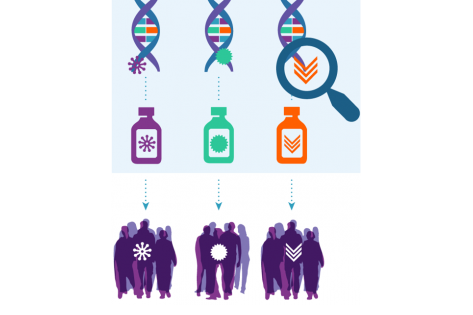COVID-19 and Clinical Trials: Continuing Care in a Pandemic
March 3, 2021Ongoing Trial: For patients with advanced or rare cancers, NCI-MATCH may offer a treatment option
June 24, 2021
- Breast Cancer – Triple-negative breast cancer (TNBC) is an aggressive disease that grows and spreads quickly. Capecitabine chemotherapy is routinely used to treat patients with TNBC who still have cancer remaining after completing initial chemotherapy. The randomized phase III trial EA1131 explored whether platinum chemotherapy would be better than capecitabine for these patients, particularly the ones with basal-like subtype TNBC and more than 1 centimeter of disease remaining in the breast. The results show that platinum chemotherapy should not be used in this setting. The group of trial participants who received platinum chemotherapy did no better and had a higher number of severe side effects compared to the group that received capecitabine. Across both groups, survival was lower than expected. These findings suggest that capecitabine should continue to be the standard of care for patients with TNBC who still have cancer remaining after completing initial chemotherapy—but more effective therapies are sorely needed. Mayer IA. J Clin Oncol. 8 June 2021
- Breast Cancer – A breast MRI (magnetic resonance image) before surgery can help women with newly diagnosed ductal carcinoma in situ (DCIS) decide whether to have a lumpectomy or mastectomy. An MRI shows the extent of disease more accurately than mammography or ultrasound. However, there are concerns that MRI, rather than guide more targeted treatment, may result in unnecessary over-treatment—mastectomies in particular. Study E4112 (Lehman CD. JAMA Oncol. 1 Jul 2019) provided data on the clinical value of a pre-surgery breast MRI for women with DCIS who were candidates for a lumpectomy based on their medical information yet were still considering a mastectomy. A new report from E4112 looks at the reasons why. Before the MRI, surveys completed by trial participants revealed that age and worry about cancer were the top reasons for preferring a mastectomy. After the MRI and a surgeon consultation, surveys indicated entirely different reasons: MRI results showing more extensive disease than initial imaging and the surgeon's recommendation for mastectomy. These patient-reported data support the clinical value of breast MRI to help tailor treatment for women with newly diagnosed DCIS. However, to change clinical practice, these results will need to be confirmed in a large phase III trial. Fazeli S. ASCO 2021 Annual Meeting. Abstract 6564
- Caregivers – Hospitals and oncology practices sometimes provide supportive care services to improve the well-being of cancer caregivers and enhance their skills to perform caregiving tasks. But how widely are these services available in local communities? A survey among 204 oncology practice groups in the NCI Community Oncology Research Program (NCORP) found that 76% were routinely using assessment tools to identify caregiver needs. About 64% had supportive care services available to caregivers. The services were more common in the Western region of the United States, in practices with inpatient services, and in practices affiliated with a nearby Critical Access Hospital (a Medicare program to keep health services in rural areas). Nightingale CL. Cancer. 2 Nov 2020
- Lung Cancer – This article provides up-to-date information about how drugs that harness the body's immune system (immunotherapies) are reshaping the treatment of metastatic (advanced) non-small cell lung cancer (NSCLC). Immunotherapy is rapidly moving into the treatment of patients with locally advanced (stage 3) NSCLC. This paper discusses conventional chemotherapy and radiation therapy (chemo/radiation) and the results of recent clinical trials. It outlines the rationale for the randomized phase III EA5181 trial, currently enrolling patients with inoperable stage 3 NSCLC. This trial will evaluate how well the immunotherapy drug durvalumab will improve overall survival when taken during chemo/radiation treatment followed by additional durvalumab. Varlotto JM. Oncologist. 17 Feb 2021
- Older Patients – Many older adults diagnosed with cancer have other medical conditions or health issues that make it difficult to go about their daily lives—and challenging to choose the right cancer treatment for them. For this reason, medical guidelines recommend that cancer patients 65 and older undergo a geriatric assessment before starting treatment. In a survey of 934 community hospitals in the NCI Community Oncology Research Program (NCORP), only a third had access to a doctor with additional training in treating older adults (geriatrician)—and only 5% had access within the oncology clinic. The study concludes that community oncologists should not rely on geriatric specialists to perform geriatric assessments, as access to these individuals is extremely limited. Instead, models of care that include patient-reported geriatric screening tools are likely the most practical methods to improve the care of vulnerable older cancer patients and comply with treatment guidelines. Williams GR. Oncologist. 12 Aug 2020
- Throat Cancer – A less intense treatment than usual care continues to provide outstanding progression-free survival and quality of life outcomes after three years of follow-up in a group of patients with locally advanced, HPV-associated throat cancer. The randomized phase II trial E3311 continues to show that robotic surgery followed by reduced-dose radiation therapy without chemotherapy is safe in patients at intermediate risk for recurrence. This promising new approach shows a higher quality of life for patients in the trial because robotic surgery preserved throat function. The less intense treatment safely spared them from toxicities associated with radiation and chemotherapy. However, to change clinical practice, ECOG-ACRIN will need to confirm these results in a large phase III trial. Ferris RL. ASCO 2021 Annual Meeting. Abstract 6010




